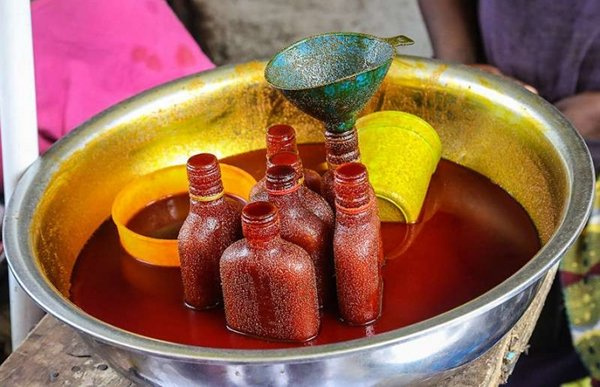The Food and Drugs Authority (FDA) has issued a stern warning to those involved in food adulteration as it embarks on a massive campaign to clear the markets of adulterated food products.
The crackdown comes in response to recent discoveries of Sudan 4 dye—a cancer-causing textile dye—being illegally mixed into palm oil.
Deputy CEO of the FDA's food division, Rodrick Daddey-Agyei confirmed that four individuals have already been arrested for their involvement in this illicit practice.
Speaking to JoyNews, Mr Daddey-Agyei stated that the FDA is committed to eradicating food adulteration.
“Arrests were done, and then people at the market, especially Anyaa and Nima, we got some of the vendors who had it in them. I can say we made over four arrests. Perpetrators who think they will still want to add the dye for whatever reason should know that their days are numbered, and we will get them.
“Dr Delese Darko, the Chief Executive is very resolute on this. We are still very hard, and we are after that. And it's not even just palm oil. It is for food adulteration. Anybody out there who thinks that they want to put something in the food, for example, as you are talking to me when you fry your yam at home, it looks white. Doesn’t it? Why does the one that is being sold by the roadside look yellow? So the issue of adulteration is a big one. Anybody who sees anything, should tell the nearest FDA office, and let the Environmental Health Office also know because we work with them. We have the food safety policy.”
The FDA also reported a notable decrease in the presence of Sudan dyes in palm oil, with contamination levels dropping from 98% to 6%.
“The level has gone down. It's now 94% free of the dye. We are not completely happy. About 6% still needs to be worked on, but it makes a big difference to show that some years ago, it was 98% contaminated, and due to the work the Food and Drugs Authority has done, the dye is now 6%”.
We've taken some people to the police station, and with the education that we have done, we are happy to let people know that when we took samples from a major market, actually 444 samples were taken, and 94% passed the purity test and that's good,” he said.
Latest Stories
-
We’re not targeting anyone – GTEC fires back at ‘Dr’, ‘Prof’ title abusers
19 minutes -
Ecobank-JoyNews Habitat Fair enters Day 2 with strong turnout
2 hours -
Gold Board initiative yields $3 billion economic boost in 4 months – Kwakye Ofosu reveals
4 hours -
Kwakye Ofosu reveals money saved from paid TV ban at Jubilee House
5 hours -
14 Years of production: Ghanaians see oil as neither blessing nor curse — Research
5 hours -
Judge orders Columbia student Mahmoud Khalil released on bail
6 hours -
Dr. Peter Terkper declares GNAFF Presidency bid with bold vision
6 hours -
Teenage pregnancy declines in Akatsi North as leaders call for sustained action
7 hours -
NIB, NACOC destroy $350m worth of cocaine following court order
8 hours -
Keta-Akatsi Catholic Diocese honours health workers at 33rd World Day of the Sick
8 hours -
Suspect arrested for burglary and theft at Kasoa Nyayano
8 hours -
US resumes visas for foreign students but demands access to social media accounts
8 hours -
Indian High Commission collaborates with VRCC and UHAS to champion physical, mental wellness in Volta Region
8 hours -
This Saturday on Newsfile: Galamsey fury, NPP early primaries and effects of Israel-Iran war
9 hours -
African Heads of States, Caribbean and Global Business Leaders to gather in Abuja Nigeria for 32nd Afreximbank annual meetings
10 hours

